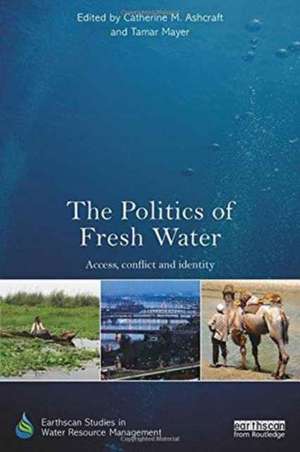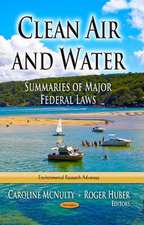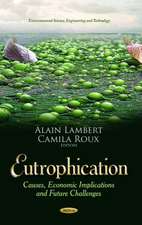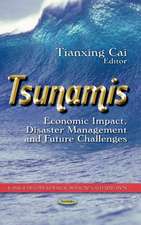The Politics of Fresh Water: Access, conflict and identity: Earthscan Studies in Water Resource Management
Editat de Catherine M. Ashcraft, Tamar Mayeren Limba Engleză Hardback – 28 noi 2016
The book analyzes responses to the water crisis as efforts to mitigate water insecurity and as expressions of collective identity that legitimate, resist, or seek to transform existing inequalities. The chapters focus on different processes that contribute to freshwater scarcity, including land use decisions, pollution, privatization, damming, climate change, discrimination, water management institutions and technology. Case studies are included from North and South America, Africa, Asia, Europe and New Zealand.
| Toate formatele și edițiile | Preț | Express |
|---|---|---|
| Paperback (1) | 386.51 lei 6-8 săpt. | |
| Taylor & Francis – 4 feb 2019 | 386.51 lei 6-8 săpt. | |
| Hardback (1) | 1056.32 lei 6-8 săpt. | |
| Taylor & Francis – 28 noi 2016 | 1056.32 lei 6-8 săpt. |
Din seria Earthscan Studies in Water Resource Management
-
 Preț: 371.13 lei
Preț: 371.13 lei -
 Preț: 326.49 lei
Preț: 326.49 lei -
 Preț: 311.39 lei
Preț: 311.39 lei -
 Preț: 155.43 lei
Preț: 155.43 lei - 8%
 Preț: 389.09 lei
Preț: 389.09 lei -
 Preț: 310.12 lei
Preț: 310.12 lei -
 Preț: 256.02 lei
Preț: 256.02 lei -
 Preț: 312.20 lei
Preț: 312.20 lei -
 Preț: 279.32 lei
Preț: 279.32 lei -
 Preț: 326.26 lei
Preț: 326.26 lei -
 Preț: 470.90 lei
Preț: 470.90 lei - 18%
 Preț: 1060.25 lei
Preț: 1060.25 lei -
 Preț: 491.82 lei
Preț: 491.82 lei - 10%
 Preț: 311.38 lei
Preț: 311.38 lei - 18%
 Preț: 1000.27 lei
Preț: 1000.27 lei -
 Preț: 479.19 lei
Preț: 479.19 lei -
 Preț: 442.68 lei
Preț: 442.68 lei - 18%
 Preț: 1000.27 lei
Preț: 1000.27 lei - 18%
 Preț: 1054.71 lei
Preț: 1054.71 lei - 18%
 Preț: 1064.70 lei
Preț: 1064.70 lei - 18%
 Preț: 1001.84 lei
Preț: 1001.84 lei - 18%
 Preț: 1051.55 lei
Preț: 1051.55 lei - 25%
 Preț: 767.07 lei
Preț: 767.07 lei - 18%
 Preț: 1002.80 lei
Preț: 1002.80 lei - 18%
 Preț: 1056.00 lei
Preț: 1056.00 lei -
 Preț: 469.34 lei
Preț: 469.34 lei - 18%
 Preț: 1173.90 lei
Preț: 1173.90 lei -
 Preț: 485.46 lei
Preț: 485.46 lei - 18%
 Preț: 1009.74 lei
Preț: 1009.74 lei - 26%
 Preț: 762.57 lei
Preț: 762.57 lei - 26%
 Preț: 764.20 lei
Preț: 764.20 lei - 12%
 Preț: 312.43 lei
Preț: 312.43 lei - 18%
 Preț: 730.71 lei
Preț: 730.71 lei - 12%
 Preț: 325.34 lei
Preț: 325.34 lei - 31%
 Preț: 765.36 lei
Preț: 765.36 lei -
 Preț: 409.31 lei
Preț: 409.31 lei -
 Preț: 416.22 lei
Preț: 416.22 lei -
 Preț: 483.49 lei
Preț: 483.49 lei - 18%
 Preț: 1001.84 lei
Preț: 1001.84 lei
Preț: 1056.32 lei
Preț vechi: 1288.19 lei
-18% Nou
Puncte Express: 1584
Preț estimativ în valută:
202.12€ • 211.03$ • 167.29£
202.12€ • 211.03$ • 167.29£
Carte tipărită la comandă
Livrare economică 04-18 aprilie
Preluare comenzi: 021 569.72.76
Specificații
ISBN-13: 9781138859227
ISBN-10: 1138859222
Pagini: 260
Ilustrații: 50
Dimensiuni: 156 x 234 x 2 mm
Greutate: 0.5 kg
Ediția:1
Editura: Taylor & Francis
Colecția Routledge
Seria Earthscan Studies in Water Resource Management
Locul publicării:Oxford, United Kingdom
ISBN-10: 1138859222
Pagini: 260
Ilustrații: 50
Dimensiuni: 156 x 234 x 2 mm
Greutate: 0.5 kg
Ediția:1
Editura: Taylor & Francis
Colecția Routledge
Seria Earthscan Studies in Water Resource Management
Locul publicării:Oxford, United Kingdom
Public țintă
Postgraduate and UndergraduateCuprins
1. The Politics of Fresh Water: Setting the Stage Tamar Mayer and Catherine M. Ashcraft 2. Ancient Roman Water Rights and Commons Theory Cynthia J. Bannon 3. Legal Mobilization and the Politics of Water Pollution: The Case of the Matanza-Riachuelo Basin in Argentina Daniel Ryan and Andrés Napoli 4. Does River Basin Governance Mean Wider Access to River Management? A Long-term Perspective from the Tennessee, Columbia, and Connecticut Rivers Eve Vogel 5. Shifting Currents in Water Diplomacy: Negotiating Conflict in the Danube and Nile River Basins Catherine M. Ashcraft 6. The Era of Big Dam Building: It ain’t Over ‘til it’s Over Francis J. Magilligan, Chris S. Sneddon, and Coleen A. Fox 7. Oil and Water Don’t Mix: Impacts of Oil and Gas Development on Sakhalin’s Water Resources Jessica K. Graybill 8. The Plight of New Zealand’s Watersheds Michael Vincent McGinnis 9. Cultural Water Wars: Power and Hegemony in the Semiotics of Water David Groenfeldt 10. Theorizing Gender, Ethnic Difference, and Inequality in Relation to Water Access and Politics in Southeastern Turkey Leila M. Harris 11. Water, Life, and Community in the Arid Realm: The Curious Case of Karez and Acequia Daanish Mustafa 12. The Politics of Muddled Waters in Gujarat: A Religious Nationalist Development Model’s Treatment of Water Pushpa Iyer 13. In Hidden View: How Water became a Catalyst for Indigenous Farmworker Resistance in Baja California, Mexico Marcos López 14. From Management to Governance: Rethinking Water Policy and Privatization on Easter Island Maria Alessandra Woolson 15. Strange Waters: From Confluence to Vortex in the Los Angeles Basin T. S. McMillin
Notă biografică
Catherine M. Ashcraft is an Assistant Professor in the Department of Natural Resources and the Environment at the University of New Hampshire, USA.
Tamar Mayer is the Robert R. Churchill Professor of Geosciences and Director of both the Rohatyn Center for Global Affairs and the Program in International and Global Studies at Middlebury College, USA.
Tamar Mayer is the Robert R. Churchill Professor of Geosciences and Director of both the Rohatyn Center for Global Affairs and the Program in International and Global Studies at Middlebury College, USA.
Descriere
This volume discusses the politics of the freshwater crisis, specifically how access to water is determined in different regions and historical periods, how conflict is constructed and managed, and how identity and efforts to control water systems, through development, technologies, and institutions, shape one another.


















